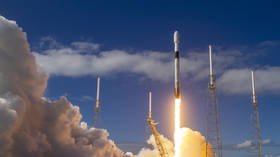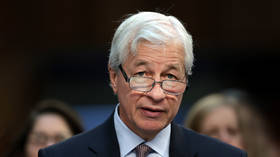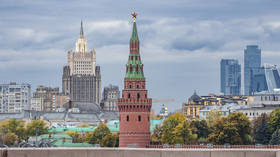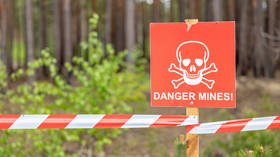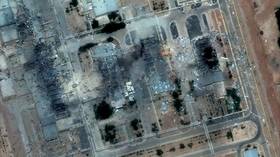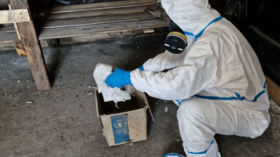Elon Musk steals even more of the night sky as he launches another batch of his planned 40,000 satellites
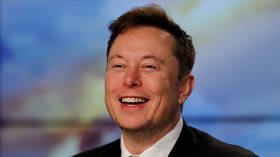
SpaceX CEO Elon Musk is accused of interfering with the work of astronomers and stargazers, but we’re powerless to stop him sending more space junk into orbit to make him more money – oops, sorry – for the good of humanity.
After years of suffering humiliating wedgies, having their heads flushed in toilets and being mocked for unseemly diligence to their studies, when the nerds exact their revenge, it seems the whole of humanity must pay the toll.
And so, this week we have witnessed the extraordinary spectacle of the launch procession of Elon Musk’s Starlink satellites, shooting upwards one after the other… after the other... after the other, ad infinitum, as he sends his latest load of money-spinners into the heavens from where, in this phase, they will provide unobstructed broadband services to previously unreachable places like, um, the northern USA and Canada.
I can’t be alone in expressing surprise that these regions don’t already have broadband, but hey-ho, I’m no aeronautical scientist and SpaceX assure me that its global coverage should be in situ next year.
So in the pursuit of better internet, we all have to put up with having the purity of the night skies now ruined forever. Alongside Musk’s proposal for up to 40,000 satellites ringing Earth, plans by those other nerd kings, Amazon’s Jeff Bezos with his 3,236-satellite Project Kuiper, and Virgin’s Richard Branson and his OneWeb partnership scheme for a few more thousand, are in the pipeline. Each of them is launching more space junk into orbit to build on their already considerable fortunes, with more reportedly in the planning stages for Apple, Boeing, Samsung and others.
And it seems there is nothing we can do about it because these things just keep on coming. The latest batch of 60 Starlink satellites are due to take off this afternoon from NASA’s Kennedy Space Center in Florida, and can be watched live.
Musk’s $10 billion Starlink constellation project has so far sent 358 krypton-propelled (yep, I thought it was just a fictional Superman thing, too) spacecraft into orbit 550km up in the sky with plans to send thousands more, some even higher, so that, some astronomers say, we will eventually be seeing more satellites than stars, thanks to the light pollution.
A miserable achievement, I’m sure inquisitive kids, amateur stargazers and astronomers would agree. “When you’re talking about 30,000 satellites, and many above the horizon at any one time, that’s what’s new about this,” one astronomer told Space.com. “It’s not going to be just the occasional interference, it’s going to be continual.”
Under the laughable claim of “Keeping Space Clean,” the SpaceX website insists that after reaching the end of their working life the proposed 1,500 quarter-ton satellites in this constellation will then “de-orbit” and re-enter Earth’s atmosphere, where 95 percent of their components will burn up in one to five years.
So with the typical working life of low-orbit satellites like these of around five years, followed by up to another five years before they hurtle flaming towards Earth, we only have to put up with them for 10 years. But that’s just one of the tens of thousands of satellites that make up the whole SpaceX project.
How’s that “Keeping Space Clean”?
Imagine having a neighbor who moved in next door and spoilt every sunny weekend by burning tyres in their back garden, completely indifferent to your existence. For 10 years.
OK, so some admittedly amazing tech floating hundreds of kilometers above us does not have the same immediate impact on our lives as a pile of smouldering, stinking rubber over the garden fence. It is, however, an incredible imposition on us all.
An imposition by strange, aloof billionaires, whose exploitation of space appears to be unpoliced and unregulated.
Also on rt.com ‘How do you still exist?’ Musk unloads on CNN after claims his ventilators were never delivered to California hospitalsOne of those, Musk, has so much money that he sent one of his electric cars into space on a rocket just for the hell of it, and blew up a teenage-tantrum style legal storm after having his offer of a submarine to help retrieve a bunch of Thai teenagers trapped in a cave rebuffed by one of the rescue team, who Musk branded a “pedo guy” – jokingly, a US court later decided.
Branson, meanwhile, has his own private paradise playground in the Caribbean where he schmoozes the rich and famous like a starstruck schoolboy. Bezos, the richest man in the world, with a $140-billion fortune (growing by $2,489 a second!), is by his own admission“goofy” and, like a Marvel character, insists “we have to go to space to save the Earth.”
While various international agreements are in place, such as the Outer Space Treaty from 1967 (two years before Apollo 11 had even landed on the Moon), they deal with disputes in or on actual places like the Moon and the International Space Station and the territorial laws that might apply there.
The occupation of space, as such, is not something we could ever reach international agreement on because there is nothing physically there to lay claim to. If we did attempt to do so, who’s to say those laws might not one day come into conflict with decisions made elsewhere in the universe by beings living on a planet far, far away?
One thing’s for sure, if that ever happened, Musk, Bezos, Branson and their diamonds in the sky would be the least of our concerns.
Like this story? Share it with a friend!
The statements, views and opinions expressed in this column are solely those of the author and do not necessarily represent those of RT.

